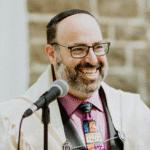
D’var Torah – Parashat Shof’tim
This week, in Parashat Shoftim, we read one of the Torah’s most resonant commandments: “Tzedek, tzedek tirdof—Justice, justice you shall pursue.” We often think of this as a grand call for legal fairness, but our tradition also understands it as a mandate for how we build a compassionate and righteous community. How do we ensure that every person is cared for, especially when they are at their most vulnerable?
Our parashah contains a strange and powerful ritual known as eglah arufah. When a person is found slain in a field and the assailant is unknown, the elders of the nearest town must perform a ceremony and declare, “Our hands did not shed this blood, nor did our eyes see it done.” The rabbis in the Talmud explain that this is not a simple denial of guilt. It is a profound statement of communal responsibility. They are declaring: “We did not know this person was hungry and failed to feed them; we did not realize they departed our town alone and failed to accompany them.” In essence, they affirm the important goal that no one under their watch should go unseen or uncared for.
This ancient ideal of a community where everyone is accounted for is one we strive for at KBI. After all (also according to the Talmud) “Kol Yisrael areivin Zeh baZeh—All Israel is responsible one for the other”. Yet, in our large, modern world, it can be a challenge. Privacy laws mean that hospitals and care facilities no longer notify clergy when a member is admitted, declines, improves, or returns home. In the busy-ness of life, it isn’t always easy for this lone clergy to know who is facing illness, celebrating a milestone, grappling with hardship, or feeling the pain of loneliness.
This is where our partnership is so vital. When you or a loved one is in need—whether for a prayer on our Mi Shebeirach list, a visit, or a confidential conversation—your call or email is not an interruption; it is a mitzvah! Hearing directly from you helps me focus my pastoral attention where it is most needed, ensuring that we, as a community, can provide support and connection before a concern has a chance to fester.
Like the elders in our parashah, let us work together to ensure that no one in our KBI family feels they are facing a difficult journey alone. Let us be a community that is truly resposible for one another; a righteous and compassionate community.
Shabbat shalom,
Cantor Jason Green